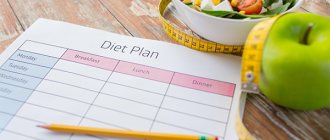Any memorable events, holidays, important dates are always accompanied by abundant feasts. Well, how can you refuse something delicious at such moments? And no restrictions can save you from overeating, which the next morning inevitably makes itself felt with heaviness in the stomach and extra pounds. How to eliminate the consequences of a wonderful and very tasty feast?
A fasting day after overeating will save you. This is an excellent opportunity to quickly restore the functioning of the gastrointestinal tract, speed up metabolism and cleanse the intestines of toxins. Regular unloading will allow you to spend much more relaxed evenings at the family and friendly table and make your figure thinner and more beautiful.
When should you have a fasting day?
You may be interested in: Kiwi during breastfeeding: is it possible or not? Kiwi: benefits and harm to the body, composition of vitamins and microelements
Fasting days should not become permanent and follow each other in a row. Such procedures should help cleanse the body that has been overloaded. For example, if you already eat right and didn’t eat a lot of heavy food on New Year’s Day, you can do without fasting. Fasting days should be arranged when you feel that your body needs it. How to do this correctly?
Regular fasting days
You may be interested in: Chinese cabbage during breastfeeding: rules of use and recommendations
While most people take a fasting day after overeating, some limit themselves to eating several times a week in order to cleanse the body. For example, all Tuesday they drink only kefir, and all Friday they eat only steamed buckwheat. All other days of the week, adherents of a healthy lifestyle try to eat healthy and light food, move a lot and drink liters of water. Everyone chooses their own lifestyle, but in reality, a fasting day after overeating can be more difficult to sit through than after moderate food consumption.
Keep a food and mood journal
A food and mood journal can be an effective tool that includes tracking what you eat and how you feel. It helps you take responsibility, identify potential triggers, and improve healthy eating habits.
Keeping a food and mood journal makes it easier to find and eliminate potential problems and triggers.
One study of 17 people found that using an online self-help program that included keeping a food diary was associated with fewer binge eating episodes (25).
Several other studies also suggest that tracking the food you eat may be associated with increased weight loss and better success in long-term weight control (26, 27, 28).
To get started, simply start recording what you eat and how you feel every day using a journal or app.
Summary:
Food and mood journals can help identify triggers to address potential problems. Research shows that using a food diary is associated with fewer binge eating episodes as well as weight loss.
This is not a panacea
Even one day of fasting, like a day of fasting, is stressful for the body. The longer and more you eat before the procedure, the more difficult it will be for you to maintain a calorie deficit. But it may also happen that the day before you eat so many high-calorie and unhealthy foods that in the following days you don’t feel like eating at all. This organism, by its behavior, shows that it is time to stop - it simply needs unloading. But it is unlikely that this procedure can be limited to one day. If you have been overeating for a week, or even more, will one fasting day after the New Year holidays be enough to bring your internal balance back to normal, let alone lose weight? Of course no.
Try practicing yoga
Yoga is a practice that involves developing the body and mind through specific breathing exercises, poses and meditation, which helps reduce stress and improve relaxation.
Research shows that yoga can help encourage healthy eating habits and reduce the risk of emotional eating.
One small study of 50 people with eating disorders found that practicing yoga for 12 weeks resulted in a significant reduction in binge eating episodes (11).
Another study of 20 teenage girls found that combining yoga with outpatient eating disorder treatment reduced depression, anxiety, and body image disorders, all of which may be factors associated with emotional eating (12).
Research also shows that yoga can reduce levels of stress hormones such as cortisol, helping to keep stress under control and prevent overeating (13, 14).
Try joining a local yoga studio to incorporate this type of exercise into your daily lifestyle. You can also use online resources and videos to practice yoga at home.
Summary:
Yoga can help prevent overeating and can reduce common causes such as stress, depression and anxiety.
How to lose weight after the holidays?
You may be interested in: Condensed milk for breastfeeding: beneficial properties, contraindications and expert advice
If after the New Year's feast you need not only to cleanse your body, but also to lose weight within a certain time frame, one fasting day, of course, will not help. To get rid of two to five kilograms of excess weight, you can try any post-holiday diet. Typically, such unloading of the body takes from 5 to 10 days. It is not recommended to follow the diet for more than ten days. During this time, your body should return to pre-holiday shape.
Exercises to lose weight
Without physical activity, you won’t be able to lose more than a couple of kilograms after the holidays. In addition, the weight will quickly return if you neglect exercise. What exercises should you do after the holidays to lose weight:
- Squats. Place your feet at shoulder level, pushing your butt back and keeping your back straight, squat down as you exhale and stand up as you inhale. Repeat the exercise for losing weight on your thighs and buttocks twice 30 times.
- Push-ups with emphasis on the floor. This exercise will help you lose weight in your arms after the holidays. Place your arms parallel to your shoulders, toes level with your hips, and keep your elbows close to your body. Get down as close to the floor as possible, then push yourself up with your arms.
- Bicycle crunches. You can lose weight in your stomach and waist after the holidays by performing abdominal crunches with alternating leg raises (the opposite knee reaches towards the elbow).
- Lunges. Alternately put your left and right legs forward, squat, forming a 90-degree angle under your knee. Exercise helps remove fat from the legs and buttocks.
- Plank. Perform the exercise daily for 1-2 minutes. Place your palms and toes on the floor, keep your back straight (without arching in the lower back). Tightening your entire body, maintain this position for the specified time.
Diet example
With a stomach stretched after the holidays, it will be difficult to reduce the amount of food you consume - you simply won’t get enough of it. Therefore, nutritionists advise reducing the volume slightly, but eliminating sugar and unhealthy fats as much as possible. For example, the New Year's Olivier salad can be replaced with a salad of cucumbers and tomatoes (preferably without oil), tangerines can be left in their place, and baked meat with pineapples with cheese and mayonnaise can be replaced with baked chicken breast with vegetables.
Of course, the menu for fasting days after overeating for the New Year should be drawn up based on the fact that in winter many low-calorie foods are difficult to find in markets and supermarkets. For example, the same vegetables and herbs, which a balanced diet should contain at least 50% of the entire meal, are either expensive in winter or not of very good quality.

Sample diet menu for the day
An example of your meals should look like this:
- 1st breakfast: two medium fruits (not bananas), 100 grams of cottage cheese with a fat content of no more than 5%, a piece of dark or grain bread, coffee or tea.
- 2nd breakfast: one vegetable, a boiled egg, a piece of dark bread.
- Lunch: lean meat or fish (steamed, baked, boiled, the main thing is less fat), vegetable salad, seasoned with lemon juice (you can use a drop of vegetable oil or a tablespoon of low-fat yogurt), side dish of your choice: buckwheat, rice, durum pasta , boiled potatoes in their jackets, etc.
- Afternoon snack: fruit or vegetable (not banana and potatoes), 125 grams of low-fat, unsweetened yogurt, bread.
- Dinner 2-3 hours before bedtime: 150 grams of lean fish (steamed, baked, grilled, but without oil), salad of fresh vegetables and herbs, side dish of your choice.
Fasting day rules
You may be interested in: Delicious salads for type 2 diabetics: recipes
How to properly spend a fasting day so that it brings maximum benefits to your body? During the procedure, you should follow several simple rules, thanks to which your body will be cleansed of toxins, and dietary restrictions will bring only positive emotions:

Contraindications
How to have a fasting day after overeating and not harm your digestive system? You definitely need to know what level of acidity your stomach has and plan your diet based on this. Often during fasting, mono-diets are used, that is, eating one or two foods. But such nutrition can cause great harm, since the product may suit one person, but cause allergies, exacerbation of ulcers, indigestion and other ailments in another. Therefore, you should not go on any diet if you do not know the characteristics of your body.
Fasting day on kefir
How to properly unload on fermented milk products? In order for the kefir diet to go like clockwork, nutritionists recommend excluding fatty and heavy foods from the diet for a day or more before the kefir day. Such a fasting day is complicated by the fact that it is completely drinking. Also, fermented milk products contain few calories, so it is difficult to achieve satiety with their help.
But the benefits of kefir cover all the inconveniences of a mono-diet. This fermented milk product perfectly removes excess water and toxins from the body, normalizes digestion, and improves immunity.

Cleansing the body
There are many ways to cleanse your body and lose weight. We suggest using them after the holidays. They are conventionally divided into three groups:
- Taking substances that absorb and remove waste and toxins from the body within 1-2 days. These substances include activated carbon. It is sold at any pharmacy without a prescription. Take the tablets half an hour before meals for 3-4 days. The dose of the drug is calculated individually: 1 tablet per 10 kilograms of weight. You shouldn’t get too carried away with taking activated carbon, since it can absorb some vitamins along with toxins. The second popular drug with an action similar to activated carbon is Ankir-B. These are tablets based on vegetable cellulose. They not only cleanse the body of toxins and metabolic products, but also suppress hunger and reduce the amount of food consumed.
- Eating foods that stimulate bowel function. Such products are: raw, boiled vegetables, in the form of salads (cabbage, carrots, beets, garlic are especially useful); cereal porridge; dairy products. Drinks: juices, green tea, dried fruit compote. The combination of carrot and beet juice is considered the most beneficial for the body. These products contain large amounts of fiber and pectin, minerals and vitamins.
- Taking pharmacy vitamin-mineral complexes. Nicotine and alcohol significantly reduce the level of vitamins in the body, especially ascorbic acid. Therefore, after the holidays, it is recommended to take 4-5 tablets up to four times a day for a week (after meals). Specially developed complexes replenish the supply of vitamins well: “Complevit”, “Vitrum” or the usual “Revit”.
These methods of cleansing and restoring the body can be carried out separately or combined.

Rules for unloading on apples
Apples can be the best fasting day after overeating. To do this, you need to consume 2 kilograms of fruit and at least 2 liters of water or green tea per day. If such a difficult fasting day is not for you, you can go on an apple-curd diet: 1 kilogram of fruit, 600 grams of cottage cheese with a fat content of up to 5% and water.

Getting enough sleep
Sleep affects hunger levels and appetite, and sleep deprivation can be associated with overeating.
In fact, one study of 146 people found that people with eating disorders reported significantly more insomnia symptoms than people without the disorder (23).
Another large study found that shorter sleep duration was associated with higher levels of the hormone ghrelin and lower levels of leptin, a hormone responsible for increasing feelings of fullness.
Additionally, sleeping up to eight hours a night has been associated with higher body weight (24).
To keep your appetite under control and reduce your risk of overeating, aim to sleep at least eight hours a night.
Summary:
An eating disorder may be associated with an increase in insomnia symptoms. Sleep deprivation has been shown to reduce levels of hormones that affect hunger and appetite.
Disadvantages of fasting days
Although many doctors and nutritionists recommend arranging fasting days from time to time, this type of diet does not bring much benefit to the body:
Source
Clean your kitchen
Having a lot of junk food in your kitchen can greatly contribute to overeating when food cravings begin to increase.
Conversely, having healthy foods on hand can reduce the risk of emotional eating by limiting unhealthy options.
Get rid of processed factory snacks like chips, candy and pre-packaged convenience foods and replace them with healthier alternatives.
Stock your kitchen with fruits, vegetables, proteins, whole grains, nuts and seeds. This will help you improve your diet and reduce the risk of overeating unhealthy foods.
Summary:
Removing unhealthy foods from your kitchen and replacing them with healthy alternatives can improve the quality of your diet and make it harder to overeat.











